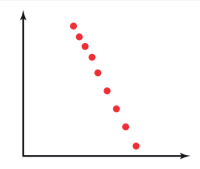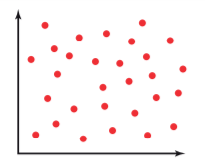
Describe the correlation in terms of direction and strength
Perfect negative linear correlation
Determine the explanatory variable from the statement
The age of a motor car and the asking price for the car
Age of a motor car
The average rate of change in the response variable for each increase of one unit of the explanatory variable
Gradient
3, 5, 7.... name the next prime number in the sequence
11

Describe the correlation in terms of direction and strength
Zero correlation
Determine the explanatory variable for the following statement
Performance in a team game and lack of sleep
Lack of sleep
The value of the response variable when the explanatory is zero
y intercept
Name the 8 planets in the solar system
Mercury, Venus, Earth, Mars, Jupiter, Saturn, Uranus, Neptune.
Describe the correlation in terms of direction and strength
r= -0.7
Moderate negative correlation
The variable that goes on the x-axis is:
Explanatory variable
Interpret the gradient of the following
predicted shoe size= 0.25 x height -33.4
(height is in cm)
For every increase in 1cm of height, there is an increase of 0.25cm in shoe size.
A 10 sided polygon is called
Decagon
Describe the correlation in terms of direction and strength
r=0.10
no correlation
The variable that goes on the y-axis is:
the response variable
Interpret the y intercept for the following
response time = -8.54 x drug dose +45.55
(time is in seconds)
When there is no drug dose administered, response time is 45.55 seconds
solve 3x+130 = 250
x = 40
To find the correlation coefficient from the coefficient of determination we do this by:
Find the square root of the coefficient of determination
accurate scales and labelled axis
Interpret the slope and y intercept for the following
Son's height (cm)= 0.54x Father's height (cm) +89.58
For every 1cm increase in father's height, there is a 0.54 increase in son's height. When father's height is zero, son's height is 89.58cm
interpret a coefficient of determination of 0.89
89% of the variation in the response variable can be explained by the variation in the explanatory variable